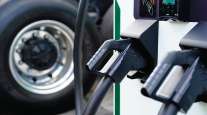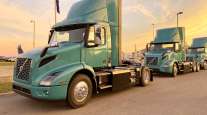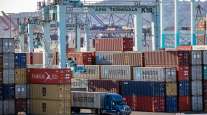California Proposal Funds Road Fixes With 12-Cent Gas Tax Hike, Electric Car Fee

The unveiling of the proposal to raise $5 billion annually through a 12-cent-per-gallon gas tax, a $100 annual fee on electric vehicles and other new taxes and fees follows years of debate over how to fund a transportation upgrade. The cost of backlogged repairs has ballooned to $59 billion for state highways and $78 billion for local roads, estimates Sen. Jim Beall, a San Jose Democrat who is carrying a road-repair bill.
“This is like fixing the roof on your house,” said Brown, standing on the east steps of the Capitol before a backdrop of Democratic legislators and construction workers in hard hats. “If you don’t fix the leak, your furniture will be ruined. Your rug will be destroyed. The wood will rot.”
Gov. Brown, legislators hit Concord to talk $52.4 billion roads bill https://t.co/w8W3kB2VqP pic.twitter.com/POrYFXl0ps — East Bay Times (@EastBayTimes) March 30, 2017
But the hard-fought deal must now be approved by the Legislature with a two-thirds vote in each house. It is shaping up to be the first real test of how far the Democrats are able to leverage the new legislative supermajority they gained after the November election.
If no Republicans vote for it, the measure would need all 27 Senate Democrats and 54 out of 55 Democrats in the Assembly to vote “yes.” And GOP leaders, left out of the talks, have already come out swinging against the tax and fee increases, saying they will hurt low- and middle-income Californians.
Brown himself conceded at the news conference that “nothing is assured here. Nothing’s in the bag.”
Previous efforts to raise the state gas tax — now at about 28 cents per gallon — have failed, but transportation officials and millions of drivers throughout the state are watching the latest push closely. Many are hoping for a breakthrough this time, in a nonelection year — and after the February evacuation of communities near Oroville Dam exposed the risks of neglecting the state’s aging infrastructure.
“Each year as we don’t deal with it, it gets larger and larger,” Randy Iwasaki, executive director of the Contra Costa Transportation Authority, said of the repair backlog.
If you couldn't tell #FixCARoads was a big deal in the Bay Area @katymurphy pic.twitter.com/R9QRgbSiG2 — Kevin Liao (@KevinLiao_) March 30, 2017
The governor’s office says the average motorist would see their taxes and fees rise by less than $10 a month, or under $120 annually. Beall estimates that someone who drives 12,000 miles per year in a car that’s “not expensive” and gets 27 miles to the gallon would pay $78 more a year — $53 more at the pump plus a $25 registration fee for less-expensive vehicles. The maximum fee — for vehicles worth over $60,000 — would be $175, but 85% of car owners would pay $50 or less.
In addition to state highway and bridge repairs, the proposal would spend $7.5 billion over the next decade on local public transportation projects and another $1 billion on infrastructure for pedestrians and cyclists — investments cheered by BART board President Rebecca Saltzman. If it passes, she said, it “will be a constant and reliable anchor for the region at a time when many of our most important institutions feel adrift, financially and otherwise.”
The agreement includes oversight from an inspector general and a constitutional amendment to ensure the money is spent on transportation and not diverted to other state priorities. If it passes, California will join a growing number of states, including Colorado, Washington and Virginia, that have levied fees on electric cars. That fee wouldn’t kick in until 2020.
California has not raised its gas tax in 23 years, according to the governor’s office, and proponents say the shortfall is obvious to anyone who drives in the state.
Ray Ruiz, a bail bondsman who traverses the Bay Area in his Toyota Camry, said the roads are so bad he has actually taken to wearing mouth guards on unfamiliar streets to protect his tongue — a safety precaution he adopted after one excruciating clash with a pothole “that was more like a trench.” Ruiz estimates he drives roughly 250 miles per day, so he knows he will pay more than the average Californian if the tax is hiked, but he supports the idea anyway.
“The way the roads are now, I’m afraid to drive,” he said. “I have a daughter who drives, and I worry about her driving with the road conditions the way they are.”
The deal hammered out by the governor’s office, leaders of the Senate and Assembly, Beall and Assemblyman Jim Frazier, D-Oakley, will be plunked into Beall’s Senate Bill 1, which has already cleared three Senate committees.
The governor’s office and the Legislature have set a deadline of April 6 for approving the deal, before the Legislature adjourns for a weeklong spring recess — and before state budget negotiations consume the Capitol. Beall said it will be heard by the Senate Appropriations committee April 3.
Cities and counties, labor unions and business groups have formed the Fix Our Roads Coalition to promote legislation to fix roads and bridges. Coalition leaders argue that the state needs to create an adequate funding stream to maintain roads, funded mainly by drivers, so that costly and dangerous backlogs don’t pile up in the first place.
“Raising additional revenues for transportation will not be an easy vote when the time comes,” said California Chamber of Commerce President and CEO Allan Zaremberg in a statement March 29, “but doing nothing will only ensure deterioration in the system necessary to move people and goods.”
Assembly Republicans — who say the state should better manage the car-related tax revenue it already has — went on the offensive March 29, posting a video critical of the Democrats’ proposal.
The GOP caucus has advanced its own proposal, carried by Assemblyman Vince Fong, R-Bakersfield. Assembly Bill 496 would pay for road repairs without raising taxes by redirecting billions of dollars from such sources as vehicle sales taxes and truck-weight fees to road repairs.
“Every dollar that is paid by the motorists should go to transportation,” Fong said.
But Brown characterized the Democrats’ proposal as a responsible, common-sense measure. “The only choice is: Do we borrow from the next generation, or do we really belly up to the bar and say, 'Here’s what it costs, and we’re going to pay it.' "
Distributed by Tribune Content Agency, LLC




